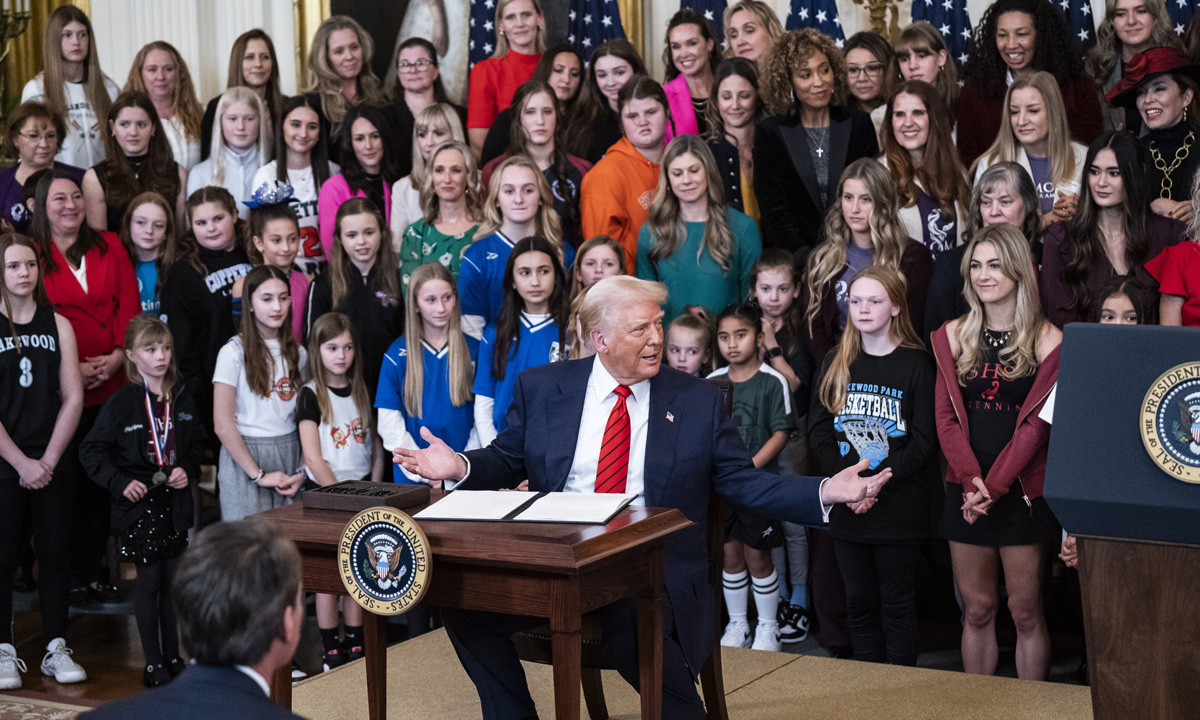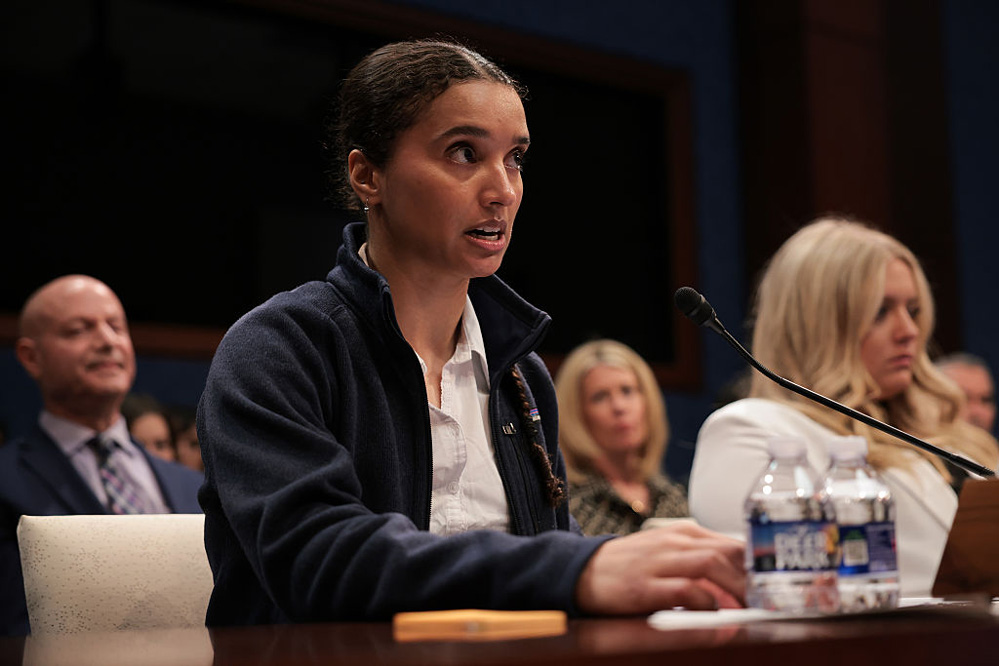Supreme Court to Address Legality of Barring Trans Athletes From School Sports
The decision to hear cases from Idaho and West Virginia comes as the Trump administration continues its crackdown on trans participation.

Get stories like this delivered straight to your inbox. Sign up for The 74 Newsletter
The right of red states to ban transgender girls from competing in female sports will head to the U.S. Supreme Court, whose conservative majority has taken an increasingly skeptical view of gender identity issues.
In two cases from West Virginia and Idaho, trans girls challenged state bans that would have prevented them from competing on women’s teams. Lower courts sided with the students, allowing them to continue competing on their existing teams as their cases progressed.
Encouraged by the Trump administration’s aggressive actions — and the court’s recent ruling upholding Tennessee’s ban on gender-affirming care for trans youth — conservatives see the court’s decision to hear the cases as an opportunity to settle a heated national debate and say definitively that Title IX does not pertain to gender identity.
The Independent Women’s Forum called the news “a watershed moment for women and girls across America.”
Advocates for LGBTQ students want the lower court decisions to stand. The U.S. Court of Appeals for the Fourth and Ninth circuits said Lindsay Hecox, a Boise State University student, and Becky Pepper Jackson, now in high school, would likely succeed in their arguments against the states.
With its 2020 Fairness in Women’s Sports Act, Idaho became the first state to bar trans girls from playing sports consistent with their gender identities. Idaho’s law includes a provision that requires students to submit to a physical exam to verify their sex in the event of a dispute. That’s a “broader concern” for all girls, said Brian Dittmeier, director of LGBTQI+ Equality at the National Women’s Law Center.
West Virginia’s Save Women’s Sports Act came a year later. Twenty-five other states have similar laws, according to the Movement Advancement Project; two states, Virginia and Alaska, have regulations that also exclude trans girls from girls’ sports. President Donald Trump and Education Secretary Linda McMahon have further elevated the issue with efforts to withhold federal funds from blue states and schools that include trans girls in female sports.
“The dignity afforded to transgender people is under attack,” Dittmeier said. A ruling in favor of West Virginia and Idaho, he said, would “provide opportunities for states to justify discriminatory laws.”

The court’s decision to hear the cases came the same week the University of Pennsylvania, under pressure from McMahon, agreed to no longer allow trans women to compete on women’s teams. As part of the deal, the university erased trans swimmer Lia Thomas’ records and issued apologies to swimmers who lost to her.
States not backing down
The administration’s case against Maine over its trans athlete policy will go to trial next year, and California on Monday said it won’t drop its trans-inclusive sports policies or issue apologies. The state drew national attention in May when a trans girl took gold in two events at a state track and field championship.
The state, however, also created a temporary rule that allowed other girls to compete even if they did not initially qualify. The rule allowed cisgender girls to earn whatever medal they would have received if trans athletes had not competed. As a result, A.B. Hernandez, the trans competitor, shared the podium with other first-place winners.

That’s the kind of accommodation more states might explore, depending on the outcome of the cases, said Doriane Coleman, a Duke University law professor. She supports transgender rights, but thinks that elite sports require special consideration.
She argued that while it’s hard to justify excluding a trans girl from afterschool sports teams, restrictions make sense in competitive athletics.
“We’ve been in a period where trans girls, their parents, their doctors and their coaches haven’t been allowed, by the advocates, to want anything other than being in girls and women’s sports,” she said.
She pointed to research showing that while puberty blockers and hormones diminish some of the physical advantage trans female athletes have over cisgender girls, “the overall advantage is always retained.”
Others argue that there’s not enough evidence to say trans girls have a consistent advantage and that socioeconomic issues, such as access to better coaching and training opportunities, also play a role.
The Biden administration tried to strike a compromise in the debate with a draft of a Title IX sports rule in 2023. It would have allowed elementary-age students and most middle schoolers to play sports consistent with their gender identity. In high school, the plan said districts could make a case for excluding trans athletes if they could show how that decision would have achieved an “important educational objective.” Officials withdrew the proposed rule before Trump took office.
Just days after his inauguration, Trump signed an executive order saying that Title IX — and the federal government in general — recognizes only two sexes and that they can’t be changed.
Now the Supreme Court, which said in 2020 that discrimination against LGBTQ employees on the basis of sex is wrong in the workplace, will wrestle with the issue. Both Idaho and West Virginia ask the court whether requiring students to compete with the sex they were assigned at birth violates the Constitution’s guarantee of equal protection. The West Virginia case also asks if Title IX allows states to exclude trans girls from girls’ sports.
Dittmeier, at the National Women’s Law Center, said there are clear differences between the trans sports cases and Skrmetti v. U.S. In that case, the court upheld a ban on gender-affirming care for trans youth, allowing states to make their own decisions on the issue. Advocates for trans youth argued that the treatments can be medically necessary and that a ban violates the Equal Protection Clause.
When the court ruled in favor of Tennessee, it didn’t consider whether the law discriminated against children and teens based on their sex. The court accepted the state’s argument that the ban was based on age or how puberty blockers or hormones were used.
The court won’t be able to avoid the issue of sex in the sports cases. The states, Dittmeier said, have to “meet a higher burden to justify the discriminatory action.” Pepper-Jackson, for example, has an amended birth certificate and has identified as a girl since the third grade. When the Fourth Circuit ruled in the case last year, Judge Toby Heytens wrote “Offering B.P.J. a ‘choice’ between not participating in sports and participating only on boys teams is no real choice at all.”
Get stories like these delivered straight to your inbox. Sign up for The 74 Newsletter

;)
